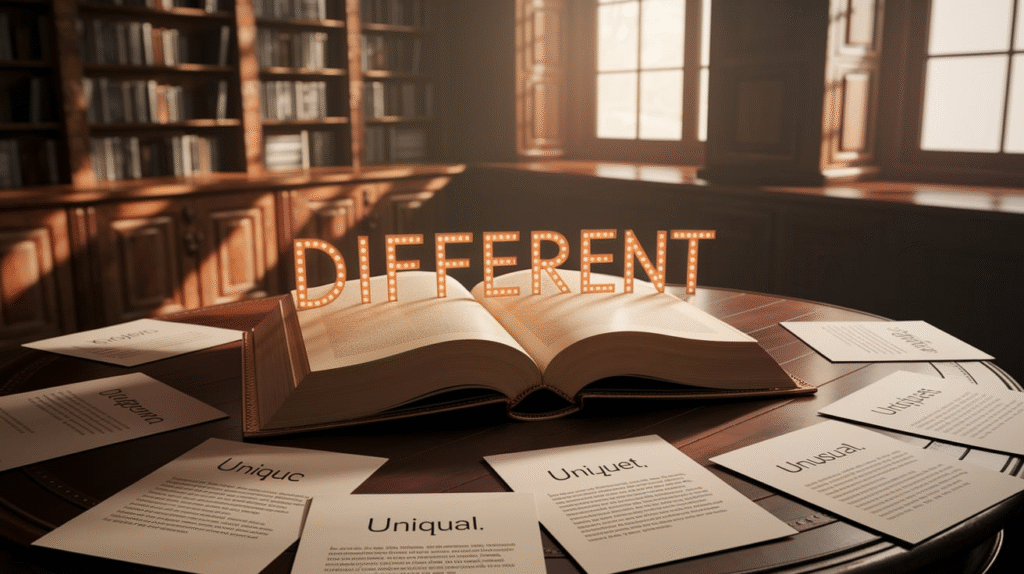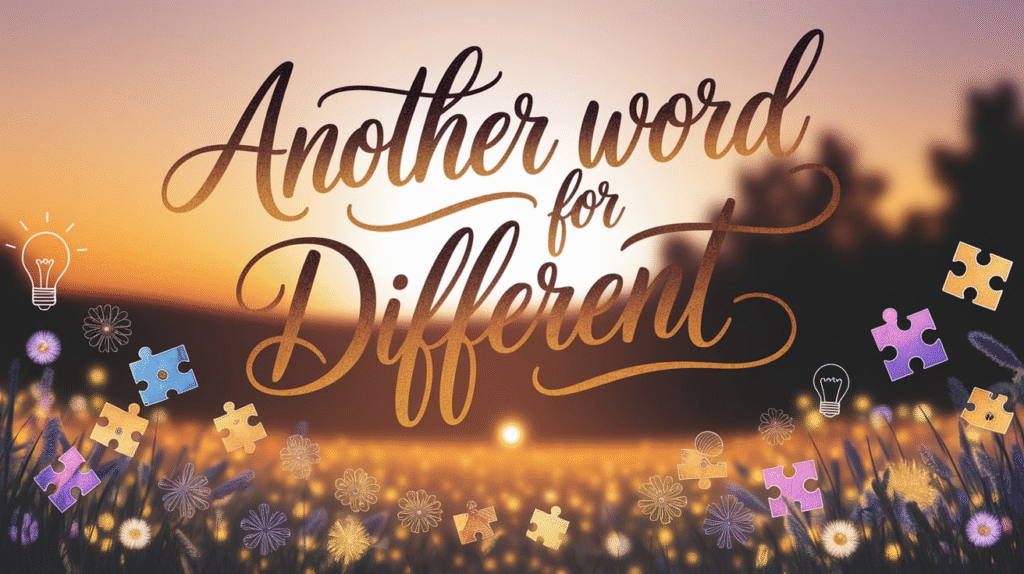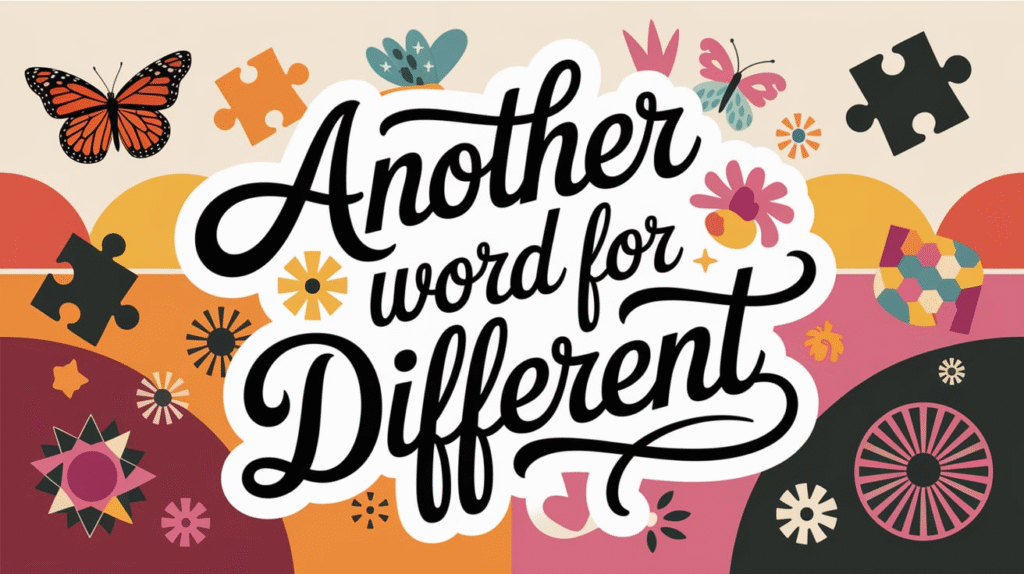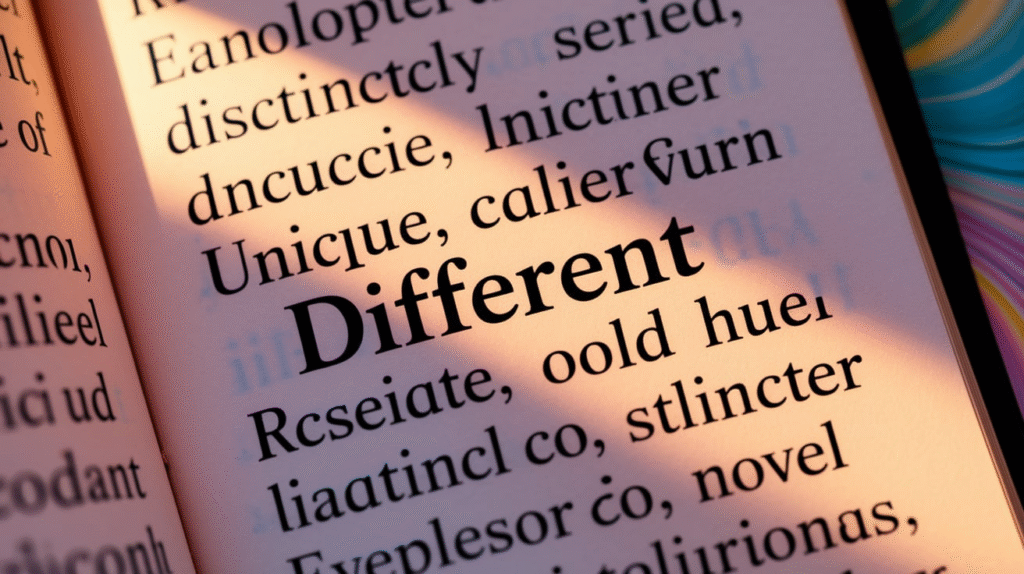
Another word for different is something we all look for when we want to say things in new ways. Maybe you’re writing a school story, a blog, or just talking to friends. Using the same word over and over can feel boring. That’s where synonyms come in! Synonyms are words that mean almost the same thing. And guess what? There are many other words you can use instead of “different” that sound more fun, smart, or even exciting.
In this blog, you will learn some simple and cool words to use instead of “different.” Don’t worry if you’re not a big reader or writer. We’ll keep everything super easy, just like learning ABCs. Whether you’re a student, a young blogger, or just someone who loves words, this post is for you. So, let’s jump in and find out how to say “different” in lots of fresh and fun ways!
When we say something is “different,” we usually mean it’s not the same as something else. Maybe it’s a different color, shape, idea, or even a different way of doing something. But did you know that “different” is just one way to say that something stands out? You can use words like “unique,” “unusual,” or “varied” to make your writing or talking more colorful. Each of these words gives a tiny bit of a new meaning. For example, “unique” means there’s nothing else like it. “Unusual” means it’s not common. And “varied” means there’s a mix of things.
Learning another word for different helps your writing sound smarter and more fun. It’s also a great way to grow your vocabulary. If you want to sound more creative or just want to avoid repeating the same word again and again, then you’re in the right place. Keep reading, and we’ll explore many fun ways to say “different” that even little kids can use with ease!
What Does “Different” Really Mean (Explained Simply)
The word “different” means something is not the same as another thing. It can be a color, shape, size, or idea that stands out. For example, if one apple is green and the others are red, the green one is different. We use the word when we want to talk about something new or special. Different can be fun because it shows that not everything has to look or be the same. People, clothes, games, and even pets can all be different. It’s a cool word to use when you want to show something is unique. So, now you know—“different” just means not the same as others, and that’s what makes life more fun and colorful!
Another Word for Different: Easy Words You Can Use Every Day

There are many other words you can use instead of “different.” These words are called synonyms. Some easy ones are “unique,” “unusual,” “odd,” “special,” and “rare.” Each word tells us something is not the same as others, but they all have a tiny bit of their own meaning. “Unique” means one of a kind. “Unusual” means not common. “Odd” can mean a little strange. “Special” means something nice that stands out. And “rare” means it doesn’t happen often. You can use these words in school, in stories, or when talking to your friends. Using other words for “different” makes your speaking and writing more fun and smart!
Say It Better Cool Synonyms for “Different” and When to Use Them
Want to make your words sound better? Instead of using “different” again and again, try cool synonyms like “distinct,” “varied,” or “unlike.” “Distinct” means clearly not the same. “Varied” means having many types. “Unlike” means something is totally not like the other. When writing, choose a word that matches what you want to say. For example, say “Her style is unique” instead of “Her style is different.” It makes your writing stronger! In school stories or talks, switching words shows you know more vocabulary. Try using one new word each day. It’s easy, fun, and makes you sound like a smart writer!
Different vs. Unique vs. Unusual: What’s the Difference
These three words are kind of like cousins—they’re close, but not the same! “Different” means not the same. “Unique” means one of a kind—there’s nothing else like it. “Unusual” means it doesn’t happen a lot, or it’s not normal. For example, a purple cat would be unusual! A shirt with only one in the world is unique. A car that looks strange compared to others is different. So, all these words help us talk about how things stand out. Use “different” for simple things, “unique” for special things, and “unusual” when something surprises you. Knowing the difference helps you say things just right!
Another Word for Different in School Essays and Stories
When you write in school, using the same word over and over is not fun. That’s why using another word for “different” is helpful. Try using “unusual,” “special,” “distinct,” or even “not the same” instead. For example, instead of writing “The dog had a different color,” you can write “The dog had an unusual color.” It sounds better and shows your teacher you know more words! Using new words also makes your story or essay more fun to read. So, before you write, think: is there another way to say “different”? If yes, try it out and make your writing shine!
Fun Words for Different to Make Your Talk More Interesting

Talking with friends is more fun when you use new words! Next time you want to say something is different, try words like “odd,” “unusual,” “one-of-a-kind,” or “special.” For example, instead of saying “That toy is different,” say “That toy is one-of-a-kind!” Doesn’t that sound cooler? You don’t have to be super smart to use fun words. Just try one new word at a time. Talking with fun words makes people listen more and think you’re great with words. So, go ahead—try using another word for “different” and surprise your friends with your awesome word skills!
Creative Ways to Use Another Word for Different in Art and Writing
In art and writing, “different” is used a lot. But you can use better words like “creative,” “unique,” “one-of-a-kind,” or “unexpected.” For example, if you draw a cat with rainbow stripes, don’t just say “My drawing is different.” Say “My art is creative and unique!” It makes your work sound special. In stories, try writing “Her ideas were unexpected” instead of “Her ideas were different.” These words help people understand how cool and new your work is. Using fun words in your writing and art shows you think in new ways. So be bold, be creative, and say it in your own style!
Don’t Repeat! How to Replace “Different” in Sentences
Repeating the same word again and again can be boring. That’s why using other words for “different” helps a lot! If you say, “This cake is different,” you can change it to, “This cake is special,” or “This cake is not like the others.” You can also say “unique,” “odd,” or “unusual.” Just pick a word that fits the meaning. Replacing words makes writing more exciting. It also helps readers stay interested. If you’re not sure which word to use, try saying the sentence out loud. Does it sound fun or plain? Choose the word that sounds best and shows what you really mean.
Easy Examples of Synonyms for “Different” Kids Can Learn
Let’s look at easy examples!
- The bird was unique because it had pink feathers.
- Her ideas were unusual, but smart.
- That hat looks odd, but fun!
- The toys in the box were all varied.
- His clothes are special and colorful.
Big List of Words That Mean Different (With Meanings for Each)

Here’s a fun list just for you!
- Unique – one of a kind
- Unusual – not common
- Odd – strange or funny
- Special – different in a nice way
- Varied – not all the same
- Unlike – not like the other
- Distinct – clearly different
- Rare – not found often
- Creative – new and fun
- Unexpected – a surprise
Conclusion
Now you know many other words for “different.” You can say things in a smarter and more fun way. These words help your writing sound better, and your talking too. Next time you want to say “different,” try using one of your new words.
Keep learning and trying new words every day. It’s like building a word treasure box! The more words you know, the more fun you can have with stories, games, and talking with friends. Words are like magic—use them well!
FAQs
Q: What is a simple word like “different”?
A: A simple word like “different” is “not the same.”
Q: What is a good word to use instead of “different”?
A: You can use “unique,” “special,” or “unusual.”
Q: Why should I not use “different” too much?
A: Using it too much can make your writing boring—new words sound better!
Q: Are “unique” and “different” the same?
A: Not always! “Unique” means one of a kind, but “different” just means not the same.
Q: Can kids use big words like “distinct” or “varied”?
A: Yes! With practice, any kid can learn and use fun new words.






